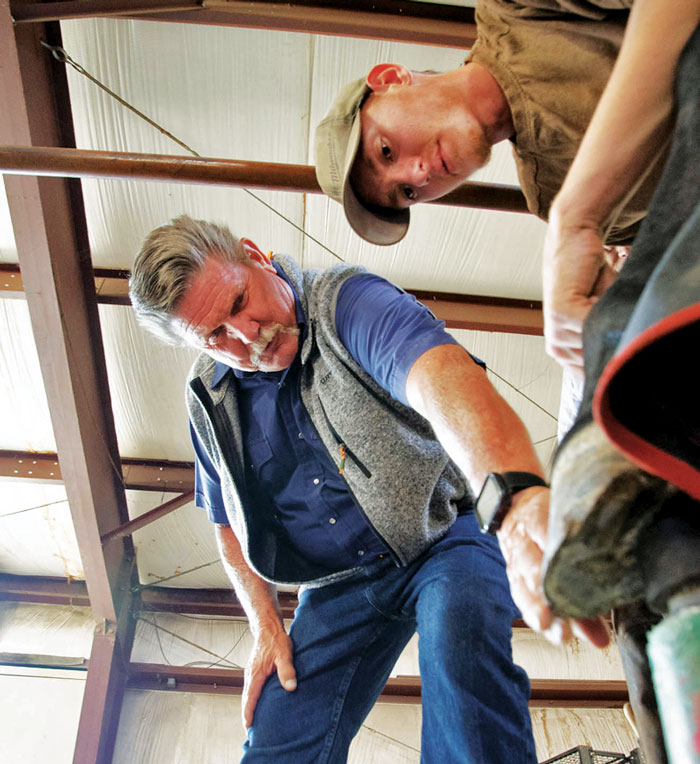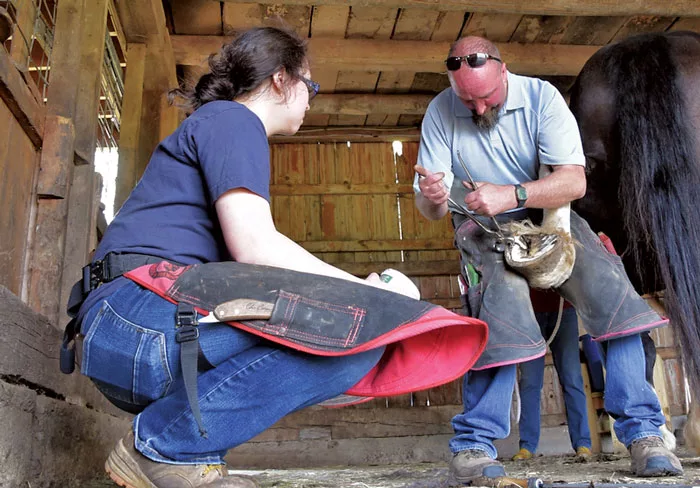After graduating from horseshoeing school, it’s tempting to believe that your education is complete. You have the foundations down. You’ve committed to the tools and equipment. You may apprentice and start building a client base. You’re eager to start your career.
Still, the first year or two or three can be daunting. You’ll encounter situations with horses, clients, vets and peers you won’t know how to navigate. Or, you’ll wonder how other farriers deal with back pain or retirement planning. These street smarts come with time, the willingness to accept community support and continuing education. Here, American Farriers Journal gathered advice from your peers to share with you in your first year after horseshoeing school.
Never Stop Learning
Best piece of advice: never assume you know anything.
— Ed Robinson, Pahrump, Nev.
What the new graduates need to know is to keep learning. Continuing education is essential. Complacency is dangerous for the horse.
— Karen Brown, Northwood, N.H.
Every day of working, I wish I were encouraged more to get some sort of qualification. Six years later, I’m studying for my first FITS test and realizing all the information I missed out on. Never stop learning.
— Horatio Delport, Johannesburg, South Africa
I stuck with my mentor until he retired after 9 years. Slowly, I worked fewer and fewer days with him, but I avoided a lot of mistakes — not just on the horse’s foot but dealing with clients.
— Chrissy Landreth, Pataskala, Ohio

Horseshoeing education is never finished, so take every opportunity to learn from mentors after graduation. Jeff Cota
Constantly seek opportunities to learn, and make the time to do it.
— Wayne Sodowsky, Apollo, Pa.
Don’t be afraid to ask for help.
— Wes Anderson, Goulburn, New South Wales, Australia
Show up to the client’s barn when you say you will. It takes a foot of knowledge to do an inch of work. Learn from everyone you can.
— Elam Fontenot, Leblanc, La.
Set Personal & Professional Boundaries
Don’t do dangerous horses. It’s not worth it. Start a retirement account ASAP.
— Phillip Williams, Virginia
No is a complete sentence.
— Diane Saunders, Bristol, Vt.
Build a business in a specific area with good clients and good horses, slowly. Too big of a coverage area with bad clients and/or bad horses will make you miserable.
— Mark Hickcox, CF, Highfill, Ark.
Comfort, support and balance. It serves true to life in general, as well.
— Tyrone Sapire, Johannesburg, South Africa
Don’t work 7 days a week no matter how good the money is.
— David Hankin, DipWCF, Christchurch, New Zealand
“It takes a foot of knowledge to do an inch of work. Learn from everyone you can…”
I’m still in my first year, but I’ve learned to charge accordingly. Don’t be the cheapest because you’re trying to build clients. Concentrate on your quality of work, and ask for help from other farriers when needed. You’ll see things you didn’t in school and learn when to say no and step away. Don’t get in over your head. And lastly, don’t let customers dictate your schedule. You do it once, and they will keep doing it.
— Bradley M. Nelson, Gilson, Ill.
Don’t accept anything and everything. Also, a perfect fit apron will help with sore hips and back.
— Justin Gibson, Beggs, Okla.
Slow & Steady Leads to Success
Master the basics, then learn how to apply them to specific needs and problems.
— Steve Kraus, Trumansburg, N.Y.
Concentrate on the quality of your work, not the quantity.
— Walt Hokrein, Mays Landing, N.J.
Make sure you’re ready to go out on your own. You only have one chance to make a first impression, and news travels fast in the horse world.
— Dave Murray, Ontario, Canada
Advice for today’s new farrier was pretty much unheard of when I started in 1973. But my advice would be to work with a well respected farrier for at least 2 years, if not longer. Go ahead and start your own business 1 or 2 days a week, but leave it at that! In the long run, you’ll improve much faster and learn to run a business and deal with issues better. It’s much more than just shoeing a horse, and you can’t learn it any better than by observing it from someone with a good practice that’s respected for not only shoeing but how the business is run!
— Martin Kenny, Carthage, N.C.
Save, save, save money because the last horse doesn't always come when you want it to or on your terms. You need to be prepared for that day.
— Roger Brown, Leesburg, Fla.







